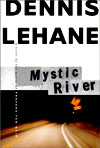
Comment
on this story
|
 |

Dennis Lehane's Mystic River offers an ode to gritty life
by Paul Lewis
Dennis Lehane is the Boston-based mystery writer who has entranced legions of readers with his series of novels featuring Olde Towne private investigators Patrick Kenzie and Angie Gennaro. (They began with A Drink Before the War and, most recently, Prayers For Rain—if you have any love of a good potboiler, buy them all. Now.). It's potentially dangerous ground when a writer who is known and loved for his ever-evolving protagonists decides to break from that cycle and write a stand-alone tale, yet that is exactly what Lehane has attempted with Mystic River (William Morrow, $25).

Lehane is a crackling storyteller, and his Kenzie and Gennaro titles are characterized by a frenetic pace and a pleasingly conversational prose style. Mystic River is also one heck of a page-turner, but Lehane is much more precise and meditative in his approach to this book. The writer continues with a recurring theme in his work, the horrors visited upon children in modern society, in presenting three young friends: the white-collar Sean Devine, the blue-collar Jimmy Marcus, and the misfit Dave Boyle. Their pending adolescence, and their knowledge of their differing roles in the social order, is already causing them tension, and that strain explodes one afternoon when two men drive up in a car and coax Dave inside. He disappears for days, but manages to escape from his abductors.
Twenty-five years later, Sean is a Massachusetts state cop, Jimmy a reformed felon, and Dave ekes out a living at a loading dock. All of them remain haunted by that afternoon when their childhoods were forcibly ripped from them. These demons crystallize one early morning when Jimmy's daughter is murdered, and Dave staggers home with someone else's blood on his clothes. Sean is assigned to the case, aware that his investigation will open old wounds and tear new ones into his life and his old neighborhood.
Lehane's talents lie not just in constructing characters, but in writing neighbors and friends. Even his villains are more human, their motivations more realized, than the typical übermensch serial killers that are de rigeur in most mystery novels. All three of his protagonists are sympathetic to one degree or another, and as a reader you're often torn between loyalties to characters you like, or at least understand. These men move through working-class neighborhoods and drink and love and hurt just like our own acquaintances and relatives. When Lehane makes us realize that these fictional characters worry about the same concerns as us, both epic and petty, he imparts the uncomfortable notion that we are these people, and the cycle of violence and victimhood that we think we only read about in these books could easily move into our own lives, no matter how vigilant or careful we may be.
It would be simple to say this book is about one event in our lives, one choice that molds us and reverberates through everything we do. The tone that resounds, however, is one of fate and finality, that the world is a rough place and that there's little one can do to avoid its pitfalls and its inevitable randomness. As Dave considers in one passage, "It was only in movies that people pined for the dead, their lives freezing up like broken clocks. In real life, your death was mundane, a forgettable event to everyone but you." It's easy to dismiss such talk as nihilistic if it weren't conveyed with skill, artistry, and consistency, not just in this particular prose, but in the frustrations and gut-punches that make up everyday life in the trenches of the underprivileged and forgotten.
This is not to say Mystic River is without humor. Of the many crime writers whose bread and butter is whip smart dialogue, Lehane is one of the sharpest. When suspects turn the tables on the cops during questioning, when Sean admits the reason behind his suspension from active duty, when it's revealed a robbery was undone because a thief forgot to take off his novelty mask in an elevator—it brings a welcome smile to the proceedings.
Mystic River was optioned soon after its publication by Clint Eastwood's Malpaso Pictures production company as a possible directing vehicle for the journeyman filmmaker. While not the most overtly cinematic of Lehane's works, the themes and innate human drama of this tableau of suffering, redemption, and sad inevitability, and the small solaces we fight for to keep us sane, can hopefully pass the time with the same level of insight, craftsmanship, and eye towards plot and character that the print version takes such obvious pride in. It would be a shame to see another great, heartfelt book ruined for the sake of a quick, flashy dollar.

December 6, 2001 * Vol. 11, No. 49
© 2001 Metro Pulse
|